-
Thursday, 11 April 2024 Nouvel Building, Protocol Room and online platform
Access through the Nouvel Building's main entrance, Floor 6Session 1
Online platform5pm Bisexualities
— Encounter between Sandra Bravo, Nacho M. Segarra and Carolina Meloni.
Supported by Darío Gael Blanco7pm Interdependency and Care
— Encounter between Andrea García-Santesmases, Itxi Guerra, Nerea Pérez de las Heras and Bob Pop.
Supported by Christo Casas -
Friday, 12 April 2024 Nouvel Building, Protocol Room and online platform
Access through the Nouvel Building's main entrance, Floor 6Session 2
Online platform5pm Queer and Feminist Self-defence
— Encounter between Noelia Cortés, Chenta Tsai Tseng (Putochinomaricón) and Irantzu Varela Urrestizala.
Supported by Tatiana Romero7pm Twisted Poetry Recital
— Recital with Rioko Fotabon, Eva Gallud, Roberta Marrero, Ángelo Néstore and Juanpe Sánchez López.
Supported by Laura Casielles -
Saturday, 13 April 2024 Nouvel Building, Protocol Room
Access through the Nouvel Building's main entrance, Floor 6Session 3
12pm Drag Story Hour
— Storytelling with Ely Ferrari, Margarita Kalifata, Hunky Mattel, Loba Mordiscos, Killer Queen, Ariel Rec, Estrella Xtravaganzza and Nina Vagina (Cuidadoqueteveo Producciones) -
Saturday, 13 April 2024 Nouvel Building, Auditorium 400 and online platform
Session 4
Online platform12pm Art and Twisted Culture
— Encounter between Bernardo Pajares (Arte Compacto), Javier Parra, Jesús Pascual, Juanra Sanz (Arte Compacto) and Eugenia Tenenbaum.
Supported by Andrea Galaxina5pm Autofiction
— Encounter between Elisa Coll Blanco, Mafe Moscoso, Alana S. Portero, Sara Torres and Rosario Villajos.
Supported by Ana Flecha Marco -
Saturday, 13 April 2024 Nouvel Building, Auditorium 400
Session 5
19:30 h Performance de Pink Chadora

Carla Gallent, poster for Queer L.E. The Second Queer Literature Encounter, 2024
Held on 11, 12, 13 Apr 2024
Queer. L.E. The Second Queer Literature Encounter encompasses a transversal programme which addresses issues that cross and shake transfeminisms and queer lives from different angles and perspectives in literature, advocating the sharing of a space and time of common reading, thinking and debate.
In this second edition, realised through more than twenty different authors, the encounter tackles issues such as bisexuality and plurisexualities, interdependency and care, queer and feminist self-defence, the history of art and culture from a non-cishetero-centred perspective and autofiction. Consequently, poetry, performance, drag and the podcast become mediums for words to transcend books, to reach queer bodies and give form to a community of readers, activists, writers and LGTBIAQ+ people, who, with increasing frequency, exist in contemporary literatures and, above all, resist in social struggles.
This encounter is held in collaboration with Mary Read, a bookshop and cultural space of critical thought specialised in transfeminisms and LGTBIAQ+ communities.
Organised by
Museo Reina Sofía, Librería Mary Read and Editorial Continta Me Tienes
Collaboration
consonni, Editorial Dos Bigotes, Editorial Dieci6, Kaótica Libros, Letraversal Poesía and niños gratis*
Participants
Darío Gael Blanco writes and translates for Vanity Fair, and for anyone that asks. He also teaches classes in queer culture in Spain within the university programme Tufts-Skidmore, in Madrid. He has published essays and fictional stories in collective books published by the Dos Bigotes, Amor de Madre, Levanta Fuego and Egales publishing houses.
Sandra Bravo is a journalist, therapist and activist, as well as being non-monogamous, bisexual, off-beat and a countryside/village lover. She is the author of Todo eso que no sé cómo explicarle a mi madre. (Poli)amor, sexo y feminismo (Plan B) (Editorial B, 2021) and the prologue in Una red segura. Apego, trauma y no monogamia consensuada (Continta Me Tienes, 2022), by Jéssica Fern. She coordinates the dissemination project Hablemos de poliamor y otras formas de no monogamia.
Christo Casas is a journalist, anthropologist and entity in different digital formats such as the podcast, the story and, above all, the tweet. A working-class queer who holds on to the hope of abolishing work, he writes for a number of media outlets and writes the odd novel or essay from a gender and class perspective, for instance El Power Ranger rosa (niños gratis*, 2020) and Maricas malas (Ediciones Paidós, 2023).
Laura Casielles is a poet and journalist, and author of the books Soldado que huye (Hesperya, 2008), Los idiomas comunes (Hiperión, 2010; winner of the XIII Antonio Carvajal Youth Poetry Prize and Miguel Hernández Youth Poetry Prize 2011), Las señales que hacemos en los mapas (Libros de la Herida, 2014) and Breve historia de algunas cosas (Ediciones del 4 de Agosto, 2017).
Elisa Coll Blanco writes, communicates and navigates in multidisciplinarity. She is the author of Nosotras vinimos tarde (Amor de Madre, 2023) and Resistencia bisexual (Melusina, 2021), and also participated in the anthology (h)amor9 amigas (Continta Me Tienes, 2024), which conveys obsessions with friendship, failure, housing and bisexuality. She has written for publications such as El Salto, elDiario.es, Vice and Vanity Fair, and currently writes in her own section for Pikara Magazine. In the spring of 2024 she will release her first monologue, GLORIA.
Noelia Cortés is a writer, pharmacy technician and activist for the rights of Gypsy People. Her cultural analysis seeks the inclusion of Gypsy women in feminism and advocates flamenco as a social tool. In 2021, she was selected by the Mujer Hoy magazine as one of the women who will change the future. She has published the poetry collection Del mar y la muerte (La Carmensita Editorial, 2021) and the essay La higuera de las gitanas (ediciones en el mar, 2021), in which she analyses the misrepresentation of the Gypsy People in culture.
Cuidado que te veo is a cultural and LGTBIAQ+ association. Its activities include producing the audiovisual activity Regias del drag España, which joins the paradigms of drag culture in Spain and Mexico, and Drag Story Hour, a project which advocates reading and inclusion from a drag perspective.
Ana Flecha Marco translates books and loose pages from Norwegian, English and French into Spanish. She is also a liaison and conference interpreter and writes and illustrates books and articles. She is the author of Dos novelitas nórdicas (Mr. Griffin, 2019), La niña búho y el fantástico viaje en balde (Menoslobos & Eolas, 2020) and Piso compartido (Bombas para Desayunar, 2018/Mr. Griffin, 2021), and has translated authors such as Linn Ullmann, Nina Lykke, Anna Fiske, Jenny Jordahl, Neil Gaiman, bell hooks and Rosalind E. Krauss, among others.
Rioko Fotabon (elle) is a poet and teacher who creates queer anti-racist content on the Instagram account @black.rainb0w_. Fotabon’s work seeks to rethink and end the racial and gender impositions of white supremacy, holding workshops and courses related to social justice and anti-racist poetry. She is also part of grassroots collective spaces, and vindicates the mere existence of Black trans people as a form of magical ancestral resistance.
Andrea Galaxina carries out her professional activity in the fields of teaching, publishing and culture, with her field of specialisation the cultural productions of counterculture, particularly the fanzine. She has created and directs the fanzine publisher Bombas para Desayunar and the contemporary art publisher El primer grito, and recently re-edited the essay Nadie miraba hacia aquí. Un ensayo sobre arte y VIH/sida (Continta Me tienes, 2024). She has collaborated on different projects with institutions such as the Museo de Arte Contemporáneo de Barcelona, the Museo Reina Sofía, the Centro de Arte Dos de Mayo, Móstoles, Fundación Telefónica and Tabakalera, and writes about contemporary art in Exit and La Marea.
Eva Gallud is a writer and translator. She has translated works by poets such as Emily Dickinson, H. D., and Amy Lowell and writers such as Mary Austin, Edith Wharton and Kate Chopin. Her recent publications include Todo rojo por dentro (Dieciséis, 2023), Los años oscuros (Dieciséis, 2020) and the poetry collections Letanía del frío (Ya lo dijo Casimiro Parker, 2021), Raíz de ave (Ya lo dijo Casimiro Parker, 2018) and El taxidermista (Bancarrota ediciones suicidas, 2016).
Andrea García-Santesmases Fernández is a professor in the Social Work Department of Spain’s National University of Distance Education (UNED) and a lecturer on the MA in Sexology at the Camilo José Cela University. She has participated in different national and international research projects, resulting in a number of scientific publications, most recently publishing El Cuerpo Deseado. La conversación pendiente entre feminismo y anticapacitismo (Kaótica Libros, 2023).
Itxi Guerra researches ableism, anarchism and the symbiosis that exists between other realities and oppressed bodies, for instance those of youngsters or queer people. She has written Lucha contra el capacitismo. Anarquismo y capacitismo (Editorial Imperdible, 2021) and Ruptura y Reparación de la máquina. Escritos desde un cuerpo lisiado (Trinchera, 2023).
Nacho M. Segarra is an expert in communication and gender, and a lecturer in Journalism at the Complutense University of Madrid. He is the author of Herstory. Una historia ilustrada de las mujeres and Sexbook. Una historia ilustrada de la sexualidad (Lumen, 2018), both co-written with María Bastarós, and with illustrations by Cristina Daura, and Ladronas victorianas (Levanta Fuego, 2017). Segarra has contributed to different publications like El Salto and Vanity Fair and has run activities on sexual diversity at the Centre de Cultura Contemporània de Barcelona (CCCB) and the Museo Nacional Thyssen-Bornemisza. He is a member of the Señores Bi-en collective on masculinities and bisexualities.
Roberta Marrero is a false poet, false artist and medium. Marrero’s work drinks from her obsessions: Catholic imagery, gay pornography, images of power, the sinister, the occult, her own biography and her idols. She has published the books Dictadores (Hidroavión, 2015), El bebé verde (Lunwerg, 2016), We can be heroes (Lunwerg, 2018), Todo era por ser fuego (Continta Me Tienes, 2022) and Derecho a cita (Continta Me Tienes, 2024).
Carolina Meloni is a philosopher, writer, researcher and transfeminist activist. Bisexual and borderline, traversed by two political-economic exiles. She is a professor of Philosophy at the University of Zaragoza. Her most recent publications include Transterradas: el exilio infantil y juvenil como lugar de memoria (Tren en movimiento, 2019), with M. González de Oleaga and C. Saiegh, Sueño y Revolución (Continta Me Tienes, 2021) and Feminismos fronterizos. Mestizas, perras y abyectas (Kaótica Libros, 2021).
Mafe Moscoso writes, researches, performs and imagines entanglements between ethnography and fiction. She is a professor at the BAU College of Arts and Design. In 2023, she was awarded a Hangar/Banco Sabadell grant with the project Un océano (por) venir: etno-ficciones cuir (An Ocean (to) Come: Queer Ethno-fictions). She has also published the books La Santita (Consonni, 2024), Hostal España. El gesto hospedante, la etnografía hospedante (Mr. Griffin/LAAV_,2023), the poetry book Desintegrar el hechizo: versitos anti-coloniales/Crónica Roja (La Reci, 2021) and the book-manual Etnografías sensoriales y experimentales (BAU ediciones, 2021), among others.
Ángelo Néstore is an artist whose work revolves around the poetic understood as a queer territory in which the poem hybridises with disciplines like performance, performing arts and music. Néstore has published the poetry books Deseo de ser árbol (Espasa, 2022), Hágase mi voluntad (Pre-Textos, 2020), Actos impuros (Hiperión, 2017) and Adán o nada (Bandaàparte Editores, 2017), coordinated the publication Antología de poesía Queer (Espasa, 2024) and currently co-directs the Irreconciliables International Poetry Festival of Málaga, as well as managing the poetry publisher Letraversal.
Bernardo Pajares is an English philologist who works with communication. He is part of the Museo Nacional del Prado’s social media team, and wrote and directed for the podcast from the Patria series, as well as contributing to different programmes of Radio Nacional de España, among others. With Juanra Sanz, he hosts the podcast Arte compacto on the history of diverse art and culture from a queer perspective, which in 2021 started a weekly slot on Radio Nacional de España’s Radio 5.
Javier Parra is a film critic who has worked at international festivals as a curator and jury member. He is the author of Terror en serie (Héroes de Papel, 2019), La madre terrible en el cine de terror (Hermenaute, 2020) and Scream Queer. La representación LGTBIAQ+ en el cine de terror (Dos Bigotes, 2021). He created Scream Queer in the 2022 edition of the Neuchâtel International Fantastic Film Festival (NIFFF), and is part of the ¡Estamos Vivas! podcast and the Publications Department of Sitges Film Festival - Festival Internacional de Cinema Fantàstic de Catalunya. In 2023, he coordinated the anthology ¡Larga vida al trash! El cine de John Waters como nunca te lo habían contado (Dos Bigotes, 2023) and has recently published Scream Queer 2. La venganza (Dos Bigotes, 2024).
Jesús Pascual is a screenwriter, film-maker and writer. With experience in documentary, he directed the short film Mi arma (2019) and the feature-length film ¡Dolores, guapa! (2022). He is the author of the essay Querer como las locas. Pasiones maricas ocultas en la copla de Rafael de León (Editorial Cántico, 2023).
Nerea Pérez de las Heras is a journalist and comedian. Across her career, she has written for media outlets such as El País, Vogue, Esquire, Marie Claire and Glamour, and as a comedian her stand-up sketch Feminismo para torpes (Booket, 2022) has been hugely successful and is also the title of a video series for the newspaper El País, in which she employs humour to critique the sexist rules and behaviours in our society. She currently produces the podcasts Saldremos mejores and Lo normal.
Pink Chadora is a drag queen and multidisciplinary artist who participated in the third season and All Stars version of the television programme Drag Race España, as well as touring El Gran Hotel de las Reinas: Histeria de un Crimen in Spain’s major theatres. Todo era campo (Letraversal, 2023) is Chadora’s first book of poems and poetic performance.
Bob Pop is a journalist who works in television, radio (Cadena Ser’s Hoy por Hoy) and print media, including as the deputy director of La Marea. He is the author of, among others, the books Mansos and Un miércoles de enero (Turner Publicaciones, 2018) and the two diary volumes Días ajenos (Somos Libros, 2019), which he has also adapted as a theatrical monologue with his latest volume of diaries Días Simétricos (Alfaguara, 2023). He is the creator and screenwriter of the autobiographical series Maricón perdido (2021).
Tatiana Romero Reina is a migrant and lesbian, fat, transfeminist, neighbourhooded and racialised. She is also co-founder of Grupo Kollontai, a space for the study of women’s history. Her work centres on anti-racist pedagogy through transfeminist and anti-racist workshops and training sessions in education institutions and different NGOs. She has spent more than twenty years involved in feminisms and anti-racist and LGTBIAQ+ activism, and in recent years in fat activism. She is a contributor to Pikara Magazine, Feminopraxis and El Salto and has recently coordinated the anthology (h)amor8 gordo (Continta Me Tienes, 2023).
Alana S. Portero is a historian specialised in the Middle Ages, and a playwright, stage director and writer. She regularly contributes to Público and El Diario, and occasionally to Vogue and SModa. She is the author of different poetry collections and plays, with her first foray into novels coming in the form of La mala costumbre (Seix Barral, 2023).
Juanpe Sánchez López is a writer and researcher. He has participated in the collective volume (h)amor7 roto (Continta Me Tienes, 2022) and Antología de Poesía Queer (Espasa, 2024), in addition to publishing the poetry collection Desde las gradas (Letraversal, 2021) and the essay Superemocional: Una defensa del amor (Continta Me Tienes, 2023). In 2024, he will publish his second poetry collection, also with Letraversal.
Juanra Sanz is an art historian and part of the Museo Nacional del Prado’s General Coordination team of Conservation. With Bernardo Pajares, he hosts the Arte compacto podcast on the history of art and culture from a queer perspective, which since 2021 has had a weekly slot on Radio Nacional de España’s Radio 5. They are also the authors of the essay Historias que significan and the anthology Hasta aquí hemos llegado (Editorial Egales, 2021).
Eugenia Tenenbaum is an art historian specialised in gender perspective. Her work focuses on cultural dissemination and art criticism on social media, and as a communicator she conducts guided tours, talks and workshops on art, feminism and their impact on gender relations in the creation, reception and dissemination of artistic production in congresses, universities, institutions and other spaces. She is the author of La mirada inquieta (Ediciones Temas de Hoy, 2022) and Las mujeres detrás de Picasso (Lunwerg Editores, 2023).
Sara Torres is a writer. With the novel Lo que hay (Reservoir Books, 2022) she received the award for best debut novel from Spain’s booksellers in 2022. Her theoretical-creative work focuses on the analysis of desire, body and discourse through a critical, feminist and interdisciplinary apparatus which intertwines psychanalysis, new materialisms and queer studies. She is the author of La otra genealogía (Torremozas, 2014) and the poetry books Conjuros y Cantos (Kriller71, 2016), Phantasmagoria (La Bella Varsovia, 2019), El ritual del baño (La Bella Varsovia, 2021) and Deseo de perro (Letraversal, 2023).
Chenta Tsai Tseng (Putochinomaricón) is an architect, musician and activist, as well as being an intelligent creature, committed, defiant… a sweet and sour being. Before even releasing his first EP, Corazón De Cerdo Con Ginseng Al Vapor, he had contributed to an array of publications and media outlets such as El País, La Sexta, El Confidencial, Fantastic Plastic Mag and Radio 3. In 2022, he released JÁJÁ ÉQÚÍSDÉ (Distopía Aburrida), a benchmark album in the hyperpop and futurepop sound and a snapshot of the realities that move the world.
Irantzu Varela Urrestizala is a journalist, queer transfeminist cupletista and working class, born and bred. She contributes to Pikara Magazine and SModa, and currently presents Manólogos as a playwright. She has participated in (h)amor4 propio (Continta Me Tienes, 2019), (h)amor5 húmedo (Continta Me Tienes, 2021) and (h)amor8 gordo (Continta Me Tienes, 2023). With Andrea Momoitio, she is the co-founder of La Sinsorga, a feminist cultural centre in Bilbao’s old town.
Rosario Villajos is a writer. Her work La educación física (Seix barral, 2023) won the Biblioteca Breve Award in 2023 and explores, through the eyes of a teenage girl, the themes of consent, the female body and normalised violence she suffers over time. She has also published La muela (Aristas Martínez, 2021), Ramona (Mrs. Danvers, 2019) and the graphic novel Face (Ponent Mon, 2017).

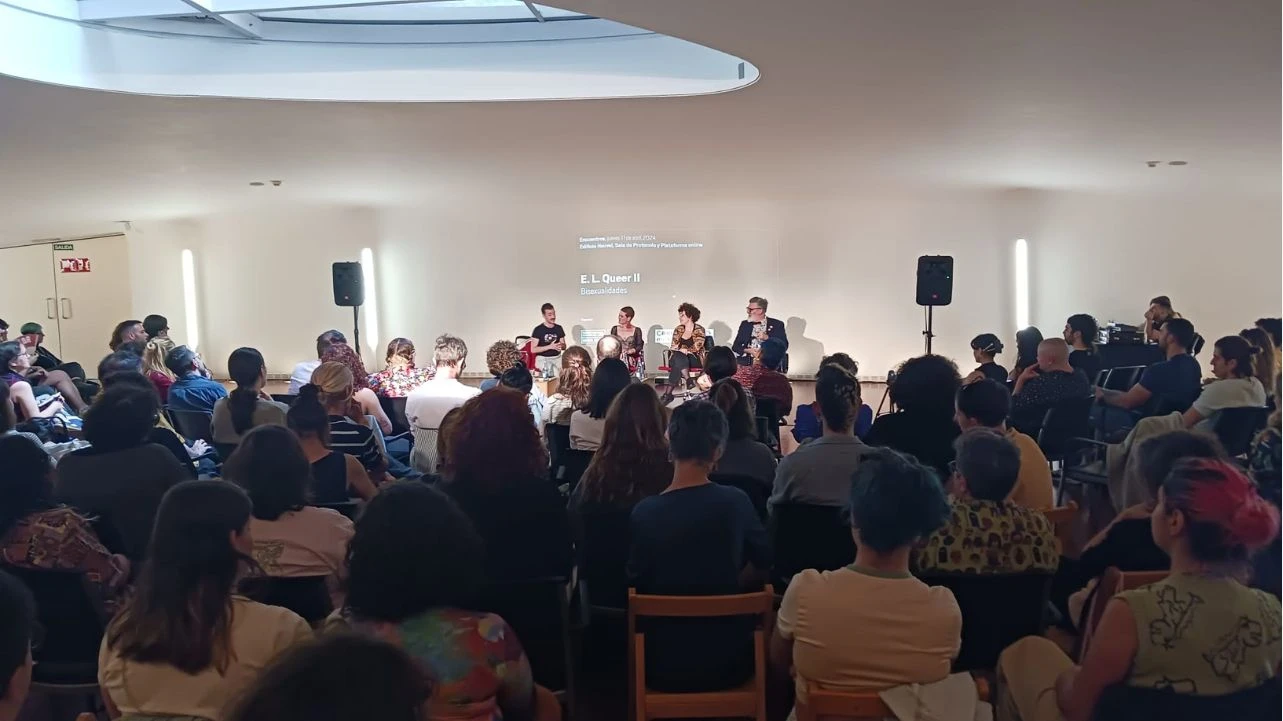
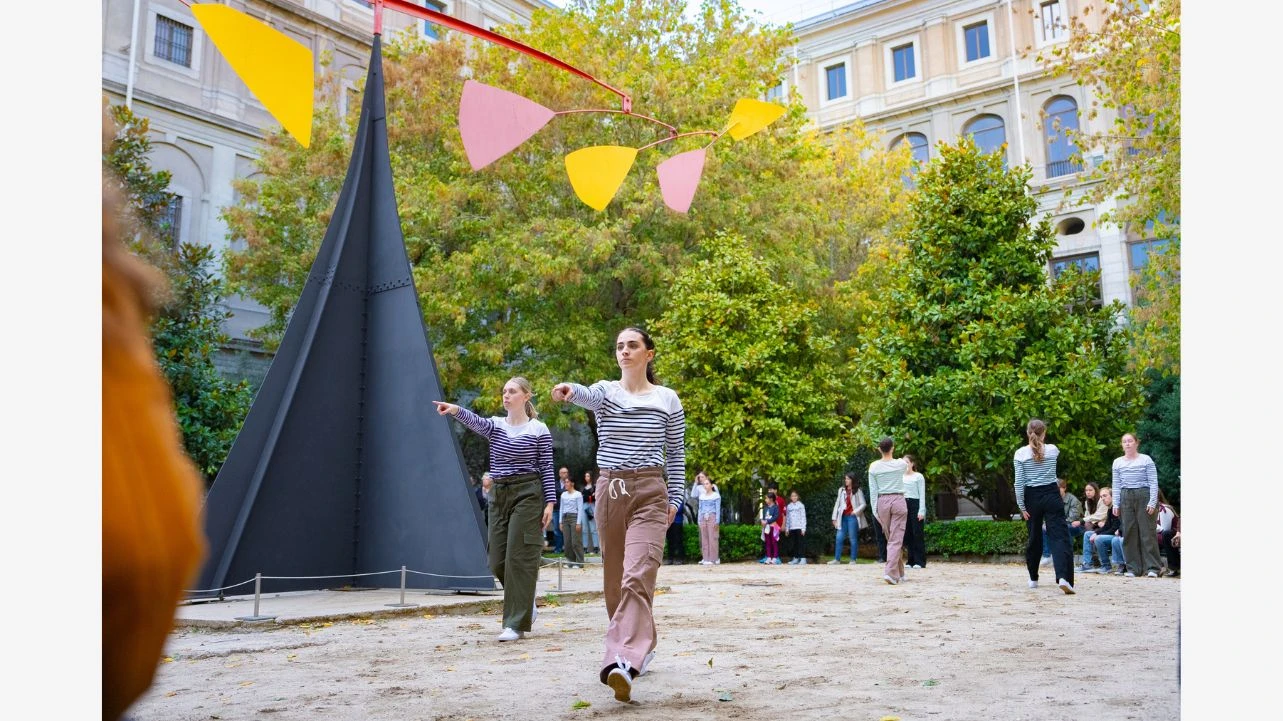
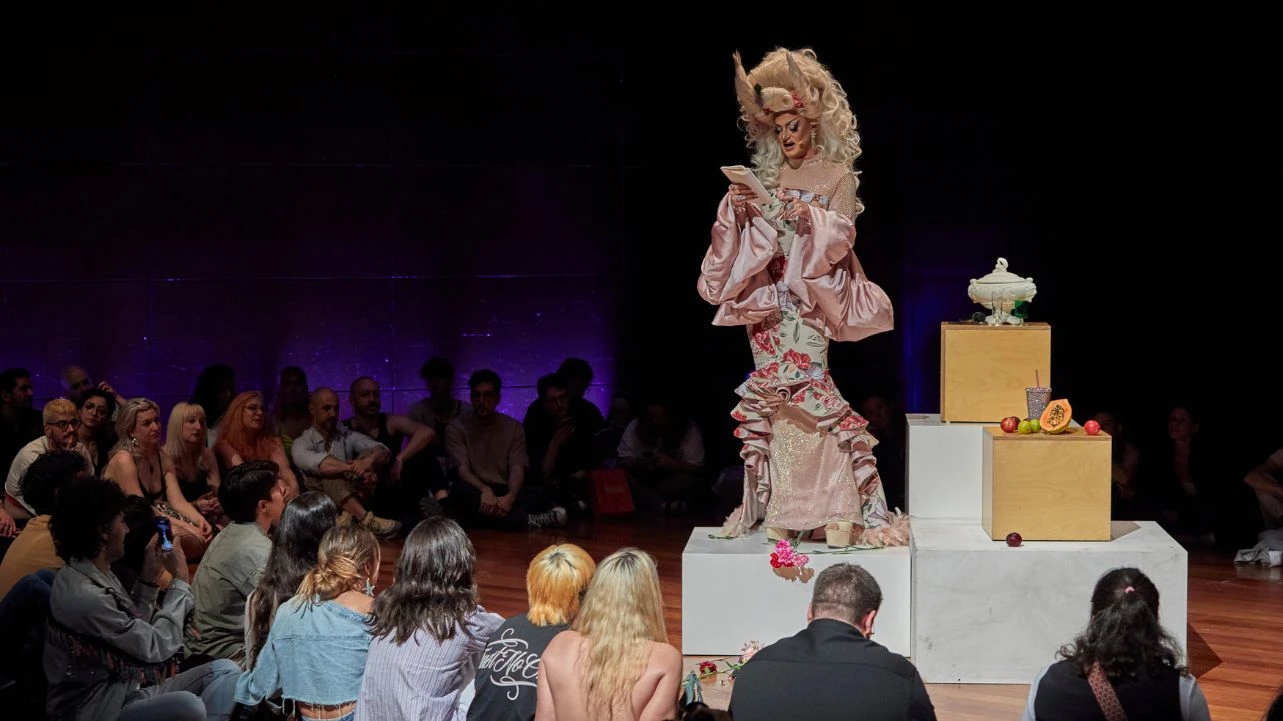
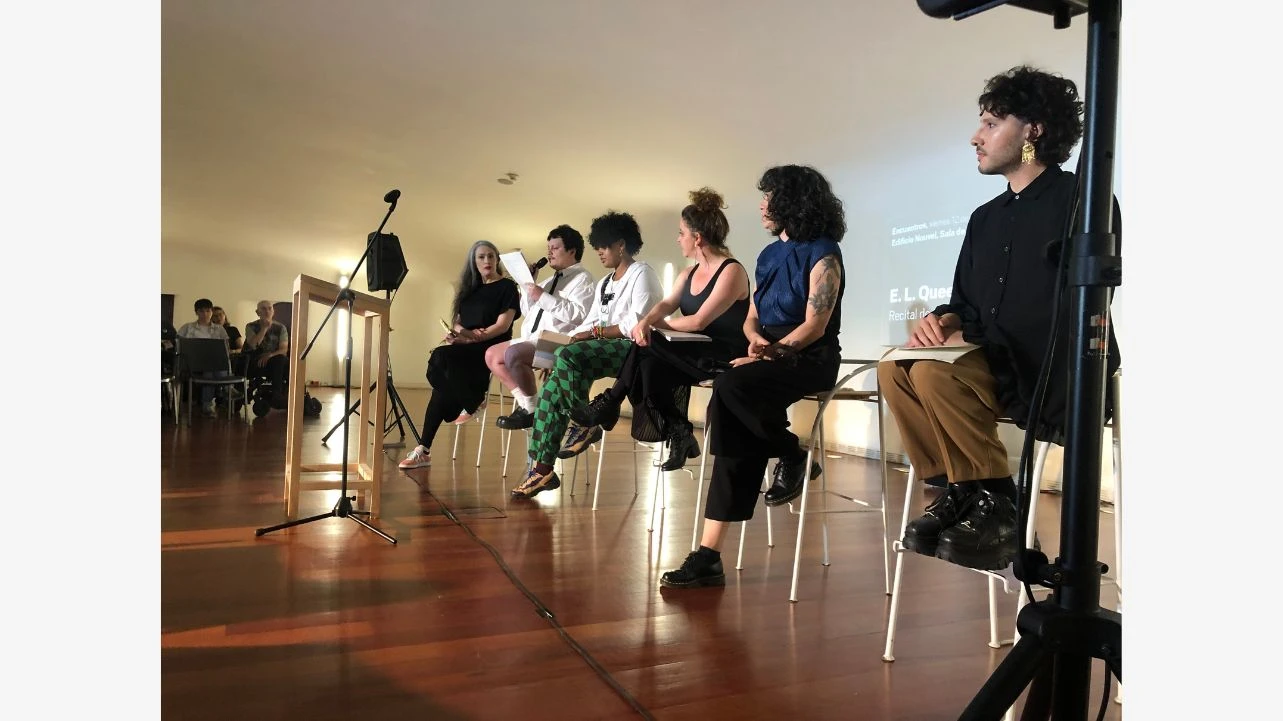
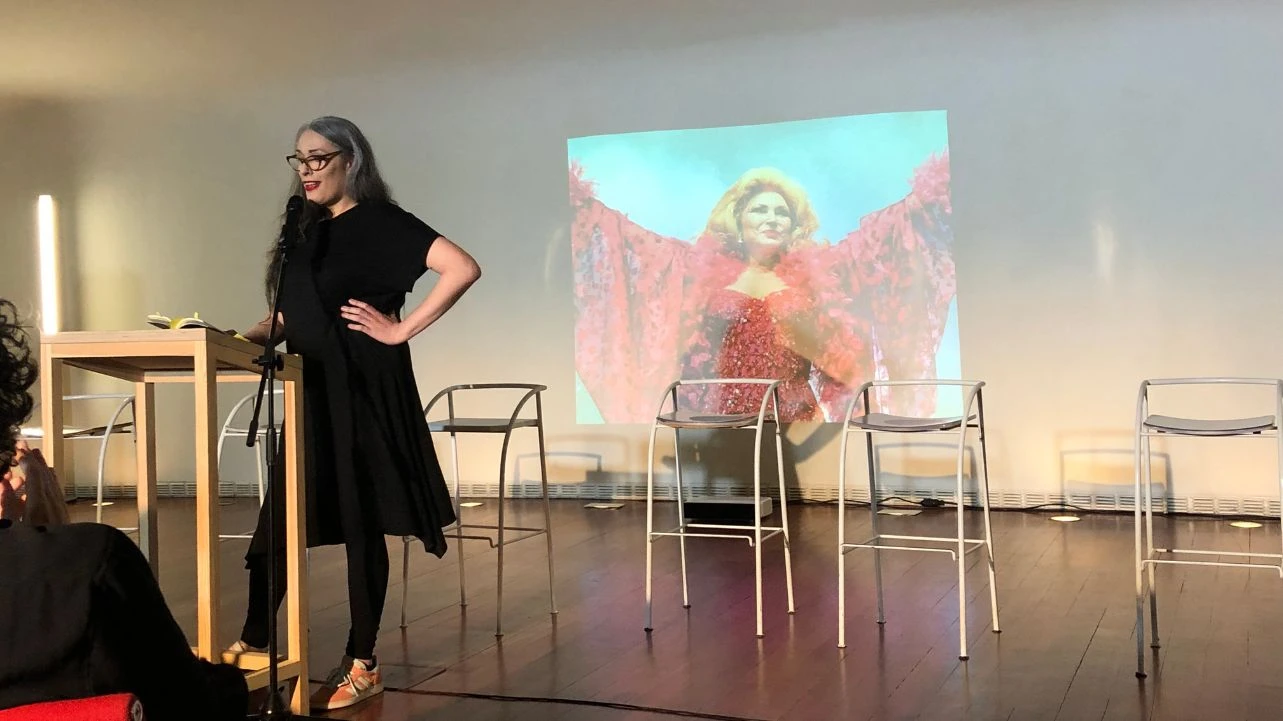
Más actividades
![Tracey Rose, The Black Sun Black Star and Moon [La luna estrella negro y negro sol], 2014.](https://recursos.museoreinasofia.es/styles/small_landscape/public/Obra/AD07091_2.jpg.webp)
On Black Study: Towards a Black Poethics of Contamination
Monday 27, Tuesday 28 and Wednesday 29 of April, 2026 – 16:00 h
The seminar On Black Study: Towards a Black Poethics of Contamination proposes Black Study as a critical and methodological practice that has emerged in and against racial capitalism, colonial modernity and institutional capture. Framed through what the invited researcher and practitioner Ishy Pryce-Parchment terms a Black poethics of contamination, the seminar considers what it might mean to think Blackness (and therefore Black Study) as contagious, diffuse and spreadable matter. To do so, it enacts a constellation of diasporic methodologies and black aesthetic practices that harbor “contamination” -ideas that travel through texts, geographies, bodies and histories- as a method and as a condition.
If Blackness enters Western modernity from the position of the Middle Passage and its afterlives, it also names a condition from which alternative modes of being, knowing and relating are continually forged. From within this errant boundarylessness, Black creative-intellectual practice unfolds as what might be called a history of touches: transmissions, residues and socialities that unsettle the fantasy of pure or self-contained knowledge.
Situated within Black radical aesthetics, Black feminist theory and diasporic poetics, the seminar traces a genealogy of Black Study not as an object of analysis but as methodological propositions that continue to shape contemporary aesthetic and political life. Against mastery as the horizon of study, the group shifts attention from what we know to how we know. It foregrounds creative Black methodological practices—fahima ife’s anindex (via Fred Moten), Katherine McKittrick’s expansive use of the footnote, citation as relational and loving labour, the aesthetics of Black miscellanea, and Christina Sharpe’s practices of annotation—as procedures that disorganise dominant regimes of knowledge. In this sense, Black Study is approached not as a discrete academic field but as a feel for knowing and knowledge: a constellation of insurgent practices—reading, gathering, listening, annotating, refusing, world-making—that operate both within and beyond the university.
The study sessions propose to experiment with form in order to embrace how ‘black people have always used interdisciplinary methodologies to explain, explore, and story the world.’ Through engagements with thinkers and practitioners such as Katherine McKittrick, C.L.R. James, Sylvia Wynter, Christina Sharpe, Fred Moten, Tina Campt, Hilton Als, John Akomfrah, fahima ife and Dionne Brand, we ask: What might it mean to study together, incompletely and without recourse to individuation? How might aesthetic practice function as a poethical intervention in the ongoing work of what Sylvia Wynter calls the practice of doing humanness?

Intergenerationality
Thursday, 9 April 2026 – 5:30pm
This series is organised by equipoMotor, a group of teenagers, young people and older people who have participated in the Museo Reina Sofía’s previous community education projects, and is structured around four themed blocks that pivot on the monstrous.
The third session gazes at film as a place from which to dismantle the idea of one sole history and one sole time. From a decolonial and queer perspective, it explores films which break the straight line of past-present-future, which mix memories, slow progress and leave space for rhythms which customarily make no room for official accounts. Here the images open cracks through which bodies, voices and affects appear, disrupting archive and questioning who narrates, and from where and for whom. The proposal is at once simple and ambitious: use film to imagine other modes of remembering, belonging and projecting futures we have not yet been able to live.

Remedios Zafra
Thursday March 19, 2026 - 19:00 h
The José Luis Brea Chair, dedicated to reflecting on the image and the epistemology of visuality in contemporary culture, opens its program with an inaugural lecture by essayist and thinker Remedios Zafra.
“That the contemporary antifeminist upsurge is constructed as an anti-intellectual drive is no coincidence; the two feed into one another. To advance a reactionary discourse that defends inequality, it is necessary to challenge gender studies and gender-equality policies, but also to devalue the very foundations of knowledge in which these have been most intensely developed over recent decades—while also undermining their institutional support: universities, art and research centers, and academic culture.
Feminism has been deeply linked to the affirmation of the most committed humanist thought. Periods of enlightenment and moments of transition toward more just social forms—sustained by education—have been when feminist demands have emerged most strongly. Awareness and achievements in equality increase when education plays a leading social role; thus, devaluing intellectual work also contributes to harming feminism, and vice versa, insofar as the bond between knowledge and feminism is not only conceptual and historical, but also intimate and political.
Today, antifeminism is used globally as the symbolic adhesive of far-right movements, in parallel with the devaluation of forms of knowledge emerging from the university and from science—mistreated by hoaxes and disinformation on social networks and through the spectacularization of life mediated by screens. These are consequences bound up with the primacy of a scopic value that for some time has been denigrating thought and positioning what is most seen as what is most valuable within the normalized mediation of technology. This inertia coexists with techno-libertarian proclamations that reactivate a patriarchy that uses the resentment of many men as a seductive and cohesive force to preserve and inflame privileges in the new world as techno-scenario.
This lecture will address this epochal context, delving into the synchronicity of these upsurges through an additional parallel between forms of patriarchal domination and techno-labor domination. A parallel in which feminism and intellectual work are both being harmed, while also sending signals that in both lie emancipatory responses to today’s reactionary turns and the neutralization of critique. This consonance would also speak to how the perverse patriarchal basis that turns women into sustainers of their own subordination finds its equivalent in the encouraged self-exploitation of cultural workers; in the legitimation of affective capital and symbolic capital as sufficient forms of payment; in the blurring of boundaries between life and work and in domestic isolation; or in the pressure to please and comply as an extended patriarchal form—today linked to the feigned enthusiasm of precarious workers, but also to technological adulation. In response to possible resistance and intellectual action, patriarchy has associated feminists with a future foretold as unhappy for them, equating “thought and consciousness” with unhappiness—where these have in fact been (and continue to be) levers of autonomy and emancipation.”
— Remedios Zafra

ARCO2045. The Future, for Now
Saturday 7, March 2026 - 9:30pm
The future, its unstable and subjective nature, and its possible scenarios are the conceptual focus of ARCOmadrid 2026. A vision of the future linked to recent memory, a flash of insight into a double-edged sword. This year's edition, as in the previous two, will once again hold its closing party at the Reina Sofia Museum. This time, the star of the show is Carles Congost (Olot, Girona, 1970), one of the artists featured in the new presentation of the Collections recently inaugurated on the 4th floor of the Sabatini Building.
Carles Congost, with his ironic and timeless gaze, is responsible for setting the tone for this imperfect future, with a DJ session accompanied by some of his works in the Cloister on the first floor of the Sabatini Building of the Museo on the night of Saturday 7 March.

27th Contemporary Art Conservation Conference
Wednesday, 4, and Thursday, 5 March 2026
The 27th Contemporary Art Conservation Conference, organised by the Museo Reina Sofía’s Department of Conservation and Restoration, with the sponsorship of the Mapfre Foundation, is held on 4 and 5 March 2026. This international encounter sets out to share and debate experience and research, open new channels of study and reflect on conservation and the professional practice of restorers.
This edition will be held with in-person and online attendance formats, occurring simultaneously, via twenty-minute interventions followed by a five-minute Q&A.
